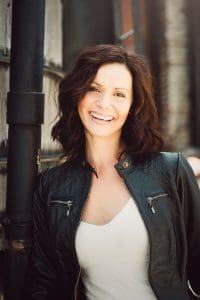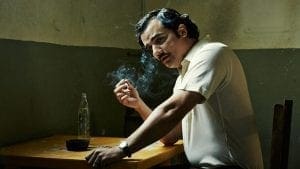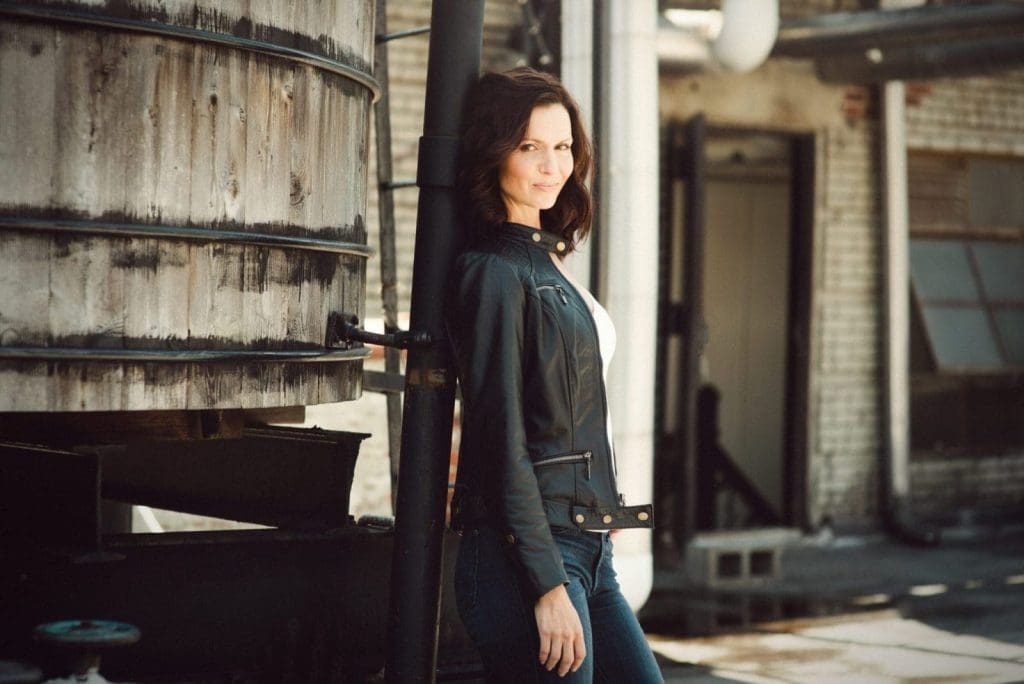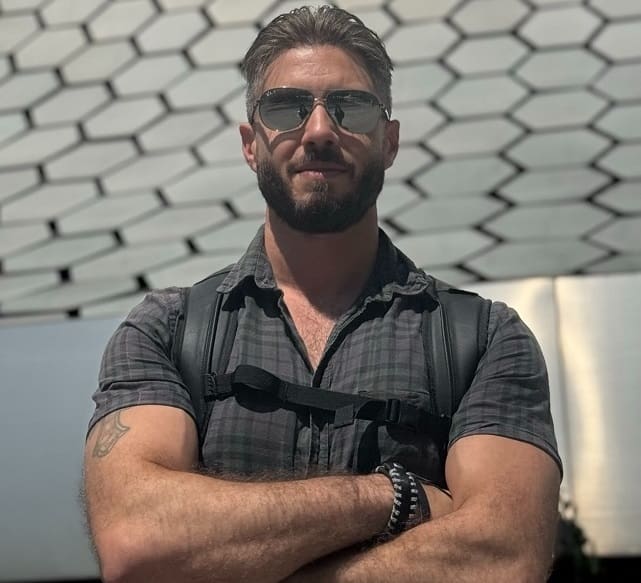“Narcos” Star Florencia Lozano Talks TV and Pablo Escobar:
Today is the season two premiere of the hit Netflix series “Narcos”, which means, many of us are eagerly counting down the minutes until we can kick off our shoes and binge watch the latest installment of the Pablo Escobar story. (Labor Day weekend plans anyone?)
The show’s first season has garnered praise from casual TV goers to film critics alike, and has since added to its cast. Among the “Narcos” newcomers, is Florencia Lozano, a New Jersey born actress who joins the cast as Claudia Messina, a DEA agent overseeing Boyd Holbrook and Pedro Pascal’s characters. No stranger to portraying law enforcement on screen, Lozano herself is a welcomed addition to the show.
With a solid resume of both TV and film roles, Lozano has enjoyed her time on the show and says that season two is “full of surprises.” We had the chance to talk to Lozano about her new role on “Narcos”, what it was like working with Wagner Moura and the war on drugs.
How did you first become a part of “Narcos”?
Florencia Lozano: I auditioned. My friend Cathy Curtin, who is on “Orange Is the New Black”, sent me a text saying that there was a part I’d be right for on “Narcos”. I called my manager about it and he submitted me. Then my friend Gary [Perez] submitted my tape and I got the role.
Had you watched the show prior to your role?
FL: The first season had not come out when I auditioned. I watched the trailer and immediately thought, wow! This looks amazing—I was super excited!

“Narcos” is a massive production. You’ve had some experience playing law enforcement roles in the past. How have your previous roles helped you prepare for Narcos?
FL: I played a cop in “The Ministers” with Harvey Keitel and John Leguizamo, and I was also a cop in “Perfect Stranger”. I’ve played cops a bunch of times. In fact, during my time filming “The Ministers”, I actually went to the precinct I was living near at the time in Manhattan, and I walked in and went up to the front desk—not realizing it was a homicide precinct. I lucked out because I was playing a homicide detective, so I asked if there was anyone I could talk to and they introduced me to this women named Irma Rivera. She really took me under her wing, we went on ride-alongs, to the shooting range, and she even showed me how to arrest people. We got to be friends, so I got to know a little bit about the culture of law enforcement. When I got the role on “Narcos” I asked her if she knew any DEA agents. I didn’t think she would but she was like, “Of course I do!” So she set me up with this guy in New York who introduced me to another guy in Bogota, who happens to be a DEA agent in Colombia. So when I got there he introduced me to all of his his DEA friends.
What can one expect from season two?
FL: Whenever people ask me, I always tell them, “If you want to know what happens, look up Colombian history.” [Laughs.] But I will say this, season two is a hunt. It’s a high speed [chase], a lot of twists and turns—really high stakes.
How do you feel the landscape of what’s possible in TV is changing? You take a Netflix show like “Orange Is the New Black” with all these great female leads, it’s incredible to see how far things have come.
FL: Everyone says it, it’s sort of the golden age of TV. It’s exciting to be part of a show that’s so loved and to be part of an industry that is exploding. I feel like shows such as “The Sopranos” and “The Wire” really blew the roof off of what is possible for TV simply by being able to tell stories over a long period of time. And there’s so many great playwrights going into TV now, too. It’s really exciting that women’s stories are being told and being put center stage. This season of “Narcos” has some strong female characters. I mean, the landscape of everything is changing now. We have our first female presidential candidate. I feel very fortunate to live in a time where, as an artist, I’m getting to portray a strong woman who is in a position of power. It was a real balancing act, but certainly thrilling. And in terms of Spanish, the degree to which there’s so much Spanish in “Narcos” and so much not just about women, but different cultures and different ethnic backgrounds. When I got the role for “Narcos” and I sat down to watch it, I was so moved by the fact that half of it was in Spanish. People are reading subtitles and listening to different voices, literally, and that’s becoming more mainstream. To me, that’s really important and exciting.
It speaks to the authenticity of the work.
FL: And it speaks to people’s openness as well, people who maybe don’t speak Spanish at all but are still willing to tune in. You know, trying to enter someone else’s reality. It’s filmed in Colombia so you’re taken there. I think at this point where we are as a country, it’s important to get outside of our comfort zone and learn about different cultures and hear things from other points of view.
How was it living outside the country during filming?
FL: I had a great time living abroad. I had never lived outside the country, my parents immigrated from Argentina and I was born in the U.S. But it was

such a gift to live in another country and feel the way different cultures value different things and overall, live differently.
What was it like working alongside Wagner [Moura]?
FL: He’s fantastic. He’s a very laid back person. That is very refreshing to be around in the world of TV where we’re all moving at such a frantic pace and telling a story that is so violent and charged with a lot of different emotions and political elements—in both the making of it and the story we’re telling. It feels challenging on a lot of levels, so to be able hang out with someone who immediately made me feel comfortable and welcomed and “a part of the family”, was incredible. I met Wagner my first day of shooting, I met his wife and we hung out and I was like, wow, he’s responsible for so much and yet he’s so grounded. Very calm and collected.
The perfect Pablo Escobar. How do you think Escobar himself would’ve fared in politics if he didn’t go down that dark road? At one point, even in the show, he was almost like a Robin Hood figure in Colombia.
FL: The story for me is really about how power corrupts, and how absolute power corrupts absolutely. We’re all susceptible to that (with some exceptions). There are a lot of factors at play in the Escobar story, because it relates to many other stories. A big one for me being, the relationship between the U.S. and Latin America. And the question of the level of poverty so much of Latin America deals with. The demand was coming from the U.S. in terms of the drug use, and Escobar was supplying that. The line between good and bad is not clear a lot of the times in terms of what does one do to feed one’s family. What would you do to stay alive? Obviously Escobar did some truly heinous things, I mean he took down an airplane and terrorized the Colombian people. He was also up against a system that didn’t like people making more money than them. The war on drugs is a very complicated issue. It’s not clear cut. The question of what to do is difficult, you see it in Mexico now people are suffering. And I have so many more questions now after working on this show.
*Season two of “Narcos” is streaming now on Netflix.com
Related articles across the web
 Review: ‘Narcos’ Delivers a Grim Harvest in Season 2
Review: ‘Narcos’ Delivers a Grim Harvest in Season 2 Narcos season 2 is on Netflix now!
Narcos season 2 is on Netflix now! Narcos Season 2 Premiere Review & Discussion
Narcos Season 2 Premiere Review & Discussion Season 2 of Narcos is a slick, stylish delight – review
Season 2 of Narcos is a slick, stylish delight – review ‘Narcos’ blasts into second season more addictive than ever
‘Narcos’ blasts into second season more addictive than ever ‘Narcos’ blasts into second season more addictive than ever
‘Narcos’ blasts into second season more addictive than ever
Michael is the Editor-in-Chief of New Jersey Digest and Creative Director at X Factor Media. A Bergen County native, he discovered his passion for storytelling while studying at Montclair State University. In addition to his work in journalism and media, Michael is an avid fiction writer. Outside the office, he enjoys kayaking, a bold glass of Nebbiolo, and the fine art of over-editing.
- Michael Scivolihttps://thedigestonline.com/author/mscivoli/
- Michael Scivolihttps://thedigestonline.com/author/mscivoli/
- Michael Scivolihttps://thedigestonline.com/author/mscivoli/
- Michael Scivolihttps://thedigestonline.com/author/mscivoli/




